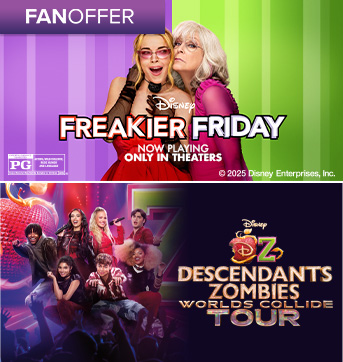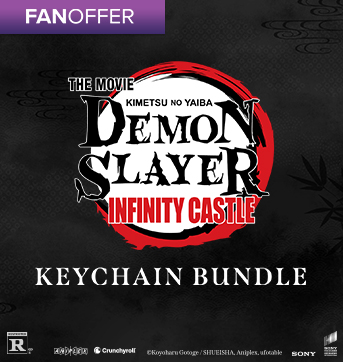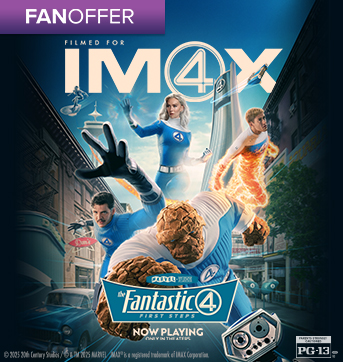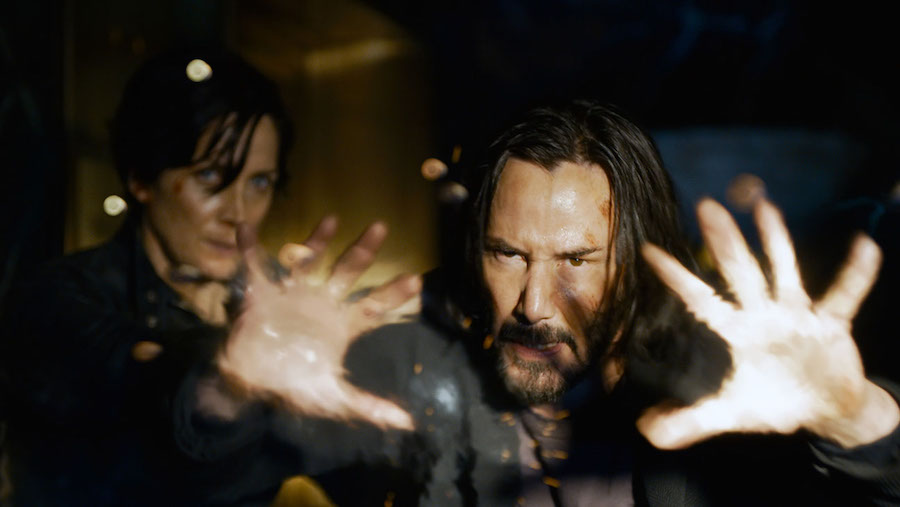
WARNING: The following interview will contain major spoilers for The Matrix Resurrections, and is meant to be read after you’ve watched the movie.
It’s been nearly 20 years since we last watched Keanu Reeves’ Neo and Carrie-Anne Moss’ Trinity fight to free humanity in Lana and Lilly Wachowski's ground-breaking Matrix trilogy, consisting of 1999’s The Matrix, 2003’s The Matrix Reloaded and 2003’s The Matrix Revolutions. Now, in 2021, Neo and Trinity are back… but this is far from a straight sequel. Old characters return as completely different versions of the ones we last saw while the film itself attempts to both be wildly entertaining and action-packed, but also amusingly self-referential at times, as if it’s making fun of its own existence.
The great thing about The Matrix Resurrections is that it is rich with storytelling and open to interpretation. Lana Wachowski's follow-up isn’t a blockbuster sequel that hands you regurgitated story beats that feel wholly unnecessary and repetitive. Everything that happens in this film happens for a reason, and the more you re-watch and explore, the more rewarding of an experience it is. This isn't a sequel that hands it all to you on a silver platter - Resurrections pushes its audience to expand their minds and come up with answers to some of the film’s biggest questions themselves.
Need some help getting started?
Fandango sat down for an extended conversation with Resurrections producer – and longtime Matrix collaborator – James McTeigue, with the purpose of our chat to be all spoilers, all the time! We went through some of the film’s major story beats with McTeigue and asked for his perspective on what’s unfolding. In some cases, he has answers, but in others, he wants to leave it up to you. Is The Matrix Resurrections the first part of a new sequel trilogy, as the film itself references early on? You can find the answer to that question, and more, below.
Fandango: The first act of this film is great – it feels like the film is almost making fun of its own existence. Can you talk a little bit about those self-referential ideas and how they came to fruition in terms of Neo's job in the Matrix and referencing Warner Bros. directly in the film? It was super entertaining. How did some of those ideas come about.
James McTeigue: Yes, you're correctly hitting on the very meta-ness of the film, which is good. And I think the genesis of that was that Lana [Wachowski] had people tell us for 20 years what they thought the Matrix was. Everyone had an opinion that they were putting out there about the Matrix, and in a way this was her way of saying, "Hey, this is what everyone's been telling me, but I'm here to tell you that here's my version of the Matrix. This is what I believe the Matrix is."
Fandango: How did you stumble upon Neo's job as this video game developer? Knowing what we know about Neo, to see him doing this inside the Matrix feels sort of torturous, as if someone is having a laugh at his expense. Why was that his job in the Matrix.
James McTeigue: Because I think it plays into his current state of being, which is like Thomas Anderson at the moment. Because what they're trying to do is get him to believe that the life that he had before was all part of this elaborate video game. And as we say in the movie, '[there's] no better place to hide what's real, and what are your feelings.' Are they even real? And so he lives in this confused state of... The thing that he's been doing in the video game… is that actually his truth? Right?
Fandango: Yeah…
James McTeigue: So we thought that if he was making a video game, but it was actually his own life, then that would be like a fun thing to do to confuse the situation.
Fandango: When Warner Brothers saw you mentioned Warner Bros. in the film and that Warner Bros. exists inside the Matrix, was that something the studio was cool with all along?
James McTeigue: Yeah, look, I think everyone has a sense of humor, right? It's kind of like taking offense to something like the Book of Mormon or something like that. At some point you just have to go, "Oh, that's a pretty funny joke." We liked it. And I think they appreciated it – that it was in with the meta-ness of everything else that we were saying. So no, they were great, never said anything about it – was never any kind of a censorship around us using them.
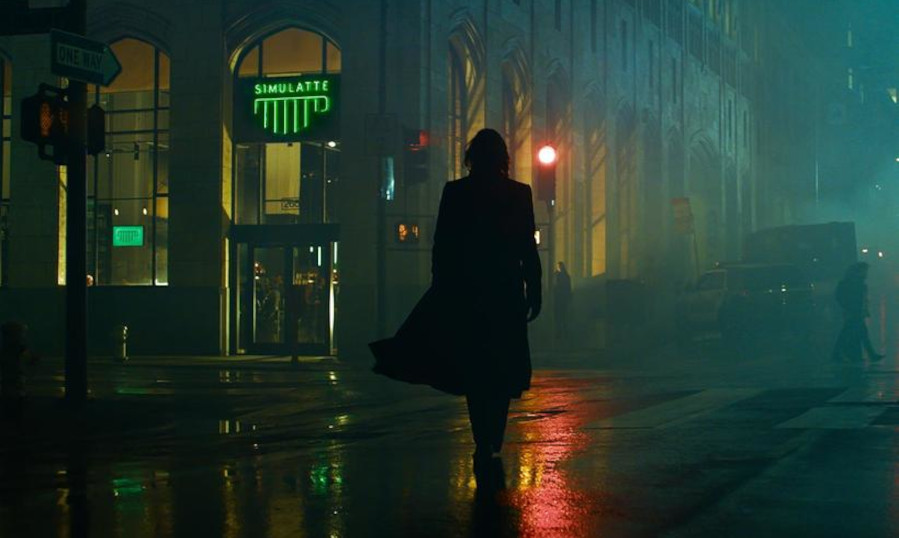
Fandango: That’s cool. At one point, a sequel trilogy is referenced. Is that this film's way of saying that Resurrections is meant to be the first part of a new trilogy?
James McTeigue: Not at the moment. I think for us at the moment, this film just lives within this film. We haven't spoken or thought about sequels yet. So, no, not at the moment.
Fandango: When Bugs discovers what appears to be a repeat of the opening of the original Matrix movie, that sets the events of this film into motion, can you talk a little bit about what's happening there? Why are the events of the first movie playing out again inside the Matrix? Talk about the origin of how that's happening inside the Matrix and how Bugs discovers it.
James McTeigue: Well, [Neo] – as much as anyone – is trying to find a way out. That’s the whole creation of the Morpheus character. There's a simulation that he's working on, which is a replica of where he used to live. But Bugs hasn't been able to find it and she's looking around. In his quest for trying to understand it, there's a sort of new Trinity, if you'd like, the Echo character. He's also created that room because he knows that's where his story began as well. He's trying to create this SIM that can help him understand his past, but also Bugs has access to it or finds access to it in the same way that the Morpheus character – or at that point, the Agent Smith character – finds it. He's trying to understand his past.
Fandango: Speaking of Morpheus and Smith, they are fascinating in this film because they're both returning characters, but very different versions of the characters that we last saw. And correct me if I'm wrong, but each of them seems to be made up of one another. Is that accurate? Are there aspects of Smith in Morpheus and aspects of Morpheus in Smith?
James McTeigue: Yeah. When you go into the construct, Morpheus even says in there that it was like he is made up of two of the important characters that actually made Neo up, like Neo's journey was guided by both Smith and Morpheus. So when you’re Thomas Anderson, Neo, [and he] goes to put that character together – he's given it two very distinct characters that were part of his essential journey.
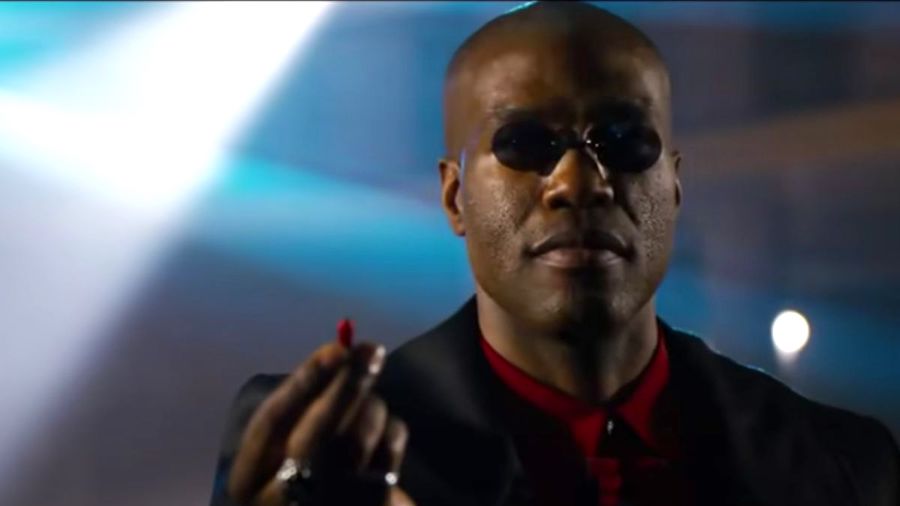
Fandango: What excites you about each of these new versions of Morpheus and Smith?
James McTeigue: Look, I think the great thing is that they're two very different characters from the last one, but they've reached back into the past, but also in this very fresh way where, if you know the mythology of the Matrix, it can make sense to you, but even if you don't, even if you've never seen one of the films before, you can come in and go, "Ah, they're two great archetypes that you can understand within the narrative of a movie." And so, I think it's that. And I think the way that we approached it or the way we approached it with their dialogues and with their characterization really makes them fresh, like you were saying.
Fandango: Love the cameo from Chad Stahelski, by the way. It was fun to see him in there playing Trinity’s husband inside the Matrix.
James McTeigue: Yeah. It was pretty sweet, the Chad thing. Chad has been with us forever. He was Keanu's double in the very first Matrix and so for him to have that through-line is great. Then he was my stunt coordinator on a couple of films that I did. On V [for Vendetta], he was a stunt coordinator. And just to see him go on and do the John Wick stuff. And then we asked him if he'd come back and do a small role and he was into it. It was fun. It was a nice family thing.
Fandango: Once we’re outside the Matrix, we see that 60 years has passed since Neo last fought to save humanity and it seems many people feel like he was successful, especially Niobe. They're happy except for a small group that's looking to find Neo. Why do you think that there is still this desire to find Neo and Trinity? What does humanity still hope to accomplish this time around, or at least this small faction of humanity?
James McTeigue: Well, as part of the story starts to explain, they still believe he is out there somewhere. It's kind of like if within our myths, we had this legendary character that we thought was still alive, there would still be people out there looking for that character, even if they were a recluse or something like that. And I think that he was such an important character that people are going, "Is he out there?" I guess all the blue-pillers are happy in their day-to-day existence.
I think in the way you find a normal society, there's always people pushing at the edges of what's known and what's unknown. And I don't think they even know that Trinity is out there, but I think that they know that Neo might be out there. So Bugs leads part of that quest. And then you have someone like Niobe who doesn't care whether Neo is out there because to her, she has a different opinion of Neo, which was she liked him as a friend, but ultimately what that brought about was war and she just wants peace.
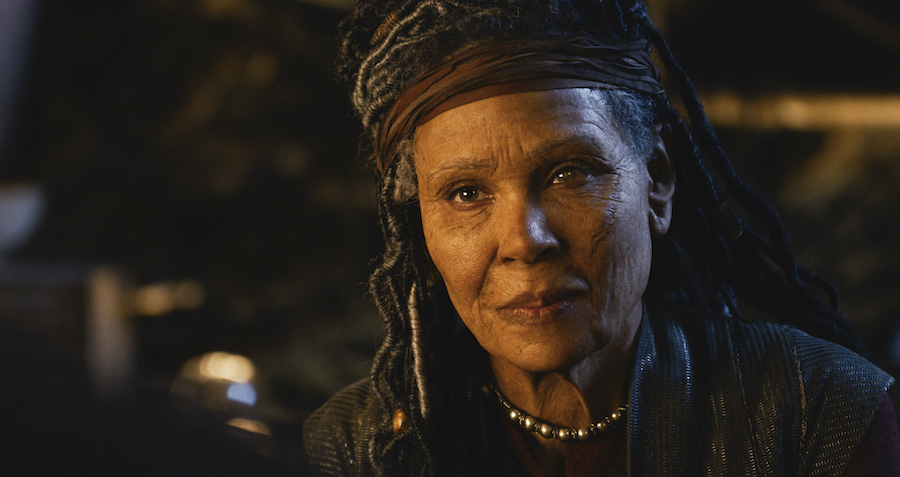
Fandango: Do you think there's still this desire to free more of humanity, and that maybe Neo could help finish what he started?
James McTeigue: Yeah, but maybe the driver is less. When it was Morpheus, Morpheus was always about freeing as many minds as you can. But what that ultimately devolved into was constant war. And I think with the advent of Neo, that Niobe is like, as Bugs says, "You're more concerned with growing fruit or strawberries than you are with freeing minds." I think you have a polarization of people who want to free minds but people who just also want to live in peace and work out an existence that isn't, obviously, [the one] that we had in the first three movies.
Fandango: Considering 60 years has passed, how much of those 60 years did you build out from a storytelling perspective? It feels like there's room to tell more stories that took place during that period of time. Did you build out the mythology of those 60 years ahead of time? Or was that ever something that was going through your minds that maybe there's the potential to tell stories during that period of time?
James McTeigue: Well, I think you always sew a path of what gets you to the 60 years in advance, but I think you can fill that in from some of the story points we give you when machines started fighting machines and then there was peace, and then Zion was wiped out, but we didn't plot it out with any prequel in mind or anything like that. We didn't do that, but you could. There's a good 60 years that you could mine there if need be.
At the moment, it's just this story and now. And I think that's also what makes it new and exciting for us, too. It isn't like a normal prequel. It's not something that you pick up and you're dropped into. And you know that there's a past, which it feels like a piece of music sometimes, where you have your own interpretation of it. You have your own interpretation of what happened before we pick up this story. And with Trinity and Neo at the end, I think that's also open to interpretation, too. What will they do next? What will they change next? And we're not going to give you the answers. They just go off and that's up to the audience to fill in.
Fandango: That was actually my next question because it's super interesting to see how Neo and Trinity swap places and now Trinity seems to be the more powerful of the two. What was the thought process there? Why was it important to the story to see that the power dynamic between them has shifted.
James McTeigue: The future is female! I think it's good. I think if you really get back into the first three movies, Trinity was as an important part of those whole stories just as much as Neo was. And if Trinity had survived in those stories, who knows what might have happened. Obviously in those stories, it was Neo that had the power that saw the Matrix for what it was, but we also thought… why couldn't Trinity this time see the Matrix for what it is? We thought that was a good story. We thought it was a good character. And we just thought it felt right for now. It just felt like it was the right piece of story to tell.
Fandango: Neil Patrick Harris is a lot of fun as The Analyst because you can’t quite tell how powerful he really is. In terms of how much control he has over the entirety of the Matrix, where do you think he lands? Because you get a sense that there's a hierarchy and he's not quite at the top. What does that hierarchy look like now? And how is it different from the original trilogy?
James McTeigue: I think we leave that up to you, really. We leave that sort of open-ended. We don't really squirrel down on, say, when Neil Patrick Harris talks about “the suits.” We have that conversation at the end there. But it's like, obviously we're talking about the machines and what runs the Matrix. And we talk about output and all those things that we touch on in the film. Yeah. I think there is a hierarchy. But I think it's actually like any corporation. I think it's diversified now. It's decentralized. And there's characters that appear in the Matrix, and he's one of them to run it in the way that Trinity and Neo are able to now shift the shape of the Matrix as well.
Fandango: If this is super successful and Warner Bros. says, "We want to keep going," are you and Lana on board to keep going? Or are you content in handing it off to the next storytellers to take this story in the direction that they so choose?
James McTeigue: I love the way you presented it as a fact that there's going to be more of these things. I think we're happy at the moment. Well, let's see what happens over the next few weeks, but our line was just to tell this story and finish with this story, and let's just see what happens after.
Fandango: I get it. Well, I hope we get to see a lot more. I think there's a lot more story to tell there.
The Matrix Resurrections is now in theaters. Grab your tickets right here at Fandango.





